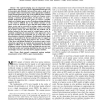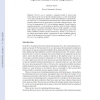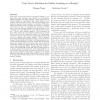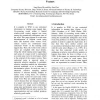1516 search results - page 70 / 304 » On the Learnability of Vector Spaces |
103
click to vote
ICASSP
2011
IEEE
14 years 1 months ago
2011
IEEE
The problem of passive localization is commonly solved by independently measuring intermediate parameters (such as angles of arrival (AOA), times of arrival (TOA)...) on several m...
TSP
2008
14 years 9 months ago
2008
The rapid developing area of compressed sensing suggests that a sparse vector lying in a high dimensional space can be accurately and efficiently recovered from only a small set of...
TLCA
2009
Springer
15 years 4 months ago
2009
Springer
Finiteness spaces constitute a categorical model of Linear Logic whose objects can be seen as linearly topologised spaces, (a class of topological vector spaces introduced by Lefsc...
SDM
2009
SIAM
15 years 7 months ago
2009
SIAM
This paper proposes Twin Vector Machine (TVM), a constant space and sublinear time Support Vector Machine (SVM) algorithm for online learning. TVM achieves its favorable scaling b...
COLING
2002
14 years 9 months ago
2002
It is popular in WSD to use contextual information in training sense tagged data. Co-occurring words within a limited window-sized context support one sense among the semantically...




